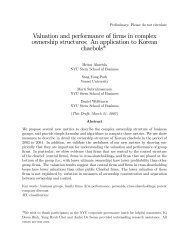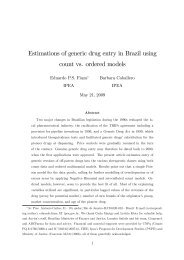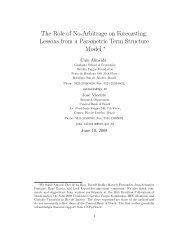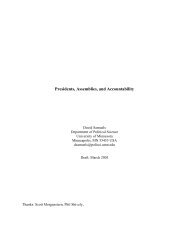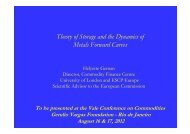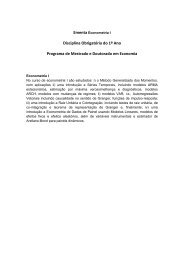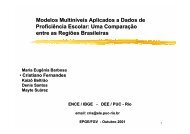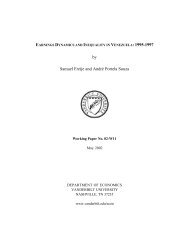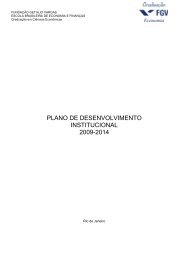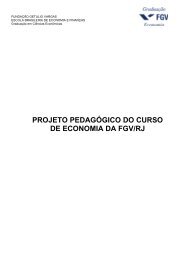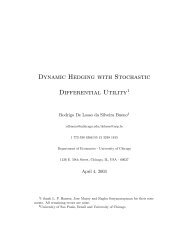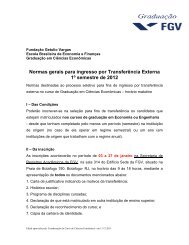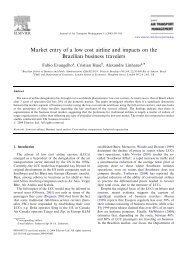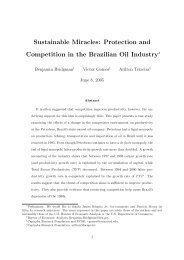Does Money in Schools Matter? Evaluating the Effects ... - EPGE/FGV
Does Money in Schools Matter? Evaluating the Effects ... - EPGE/FGV
Does Money in Schools Matter? Evaluating the Effects ... - EPGE/FGV
Create successful ePaper yourself
Turn your PDF publications into a flip-book with our unique Google optimized e-Paper software.
differences <strong>in</strong> wages between <strong>the</strong> public and private schools were higher to start with.<br />
Moreover, it seems that <strong>the</strong> <strong>in</strong>creases <strong>in</strong> <strong>the</strong> sou<strong>the</strong>ast are robust to <strong>the</strong> <strong>in</strong>clusion of o<strong>the</strong>r<br />
teacher and school characteristics, as shown by columns (3) and (4), while <strong>in</strong> <strong>the</strong> state<br />
system <strong>in</strong> <strong>the</strong> Nor<strong>the</strong>ast, <strong>the</strong> <strong>in</strong>clusion of school characteristics and directors’ wages wipes<br />
out <strong>the</strong> FUNDEF effect. In <strong>the</strong> municipal level however, <strong>the</strong> FUNDEF effect is robust to<br />
<strong>the</strong> <strong>in</strong>clusion on o<strong>the</strong>r characteristics.<br />
Tables 11 to 14 repeat <strong>the</strong> exercises of table 6 for both systems <strong>in</strong> <strong>the</strong> Nor<strong>the</strong>ast and<br />
Sou<strong>the</strong>ast regions and <strong>the</strong> results look quite <strong>in</strong>terest<strong>in</strong>g. While <strong>the</strong> differences between <strong>the</strong><br />
private and public schools <strong>in</strong> terms of proficiency were broadly similar <strong>in</strong> all systems and<br />
regions (about 30 po<strong>in</strong>ts), one can only observe a rise <strong>in</strong> <strong>the</strong> proficiency of public schools <strong>in</strong><br />
<strong>the</strong> municipal system <strong>in</strong> <strong>the</strong> Nor<strong>the</strong>ast. In <strong>the</strong> o<strong>the</strong>r system/regions, <strong>the</strong> FUNDEF dummy<br />
attracted a coefficient that is not significantly different from zero. Moreover, <strong>in</strong> <strong>the</strong><br />
Nor<strong>the</strong>ast municipal level, <strong>the</strong> magnitude of <strong>the</strong> coefficient also decl<strong>in</strong>es when o<strong>the</strong>r<br />
possible FUNDEF outcomes are <strong>in</strong>cluded <strong>in</strong> <strong>the</strong> regression, like teachers’ wages (column<br />
5), and <strong>the</strong> directors’ wage and o<strong>the</strong>r school characteristics (column 6).<br />
5) Conclusions<br />
In this paper we <strong>in</strong>vestigate <strong>the</strong> effects of a 1998 reform <strong>in</strong> <strong>the</strong> fund<strong>in</strong>g scheme of<br />
fundamental education <strong>in</strong> Brazil (FUNDEF) on <strong>the</strong> public teachers’ wages and on <strong>the</strong><br />
proficiency of public school pupils. The evidence suggests that, on average, FUNDEF<br />
raised <strong>the</strong> teachers’ relative wages and improved <strong>the</strong> relative proficiency of <strong>the</strong> public<br />
school students. Some <strong>in</strong>direct evidence was presented that showed that <strong>the</strong> effect of<br />
FUNDEF on proficiency seems to be related to its effect on wages and on school



